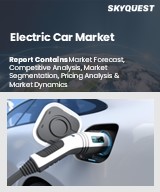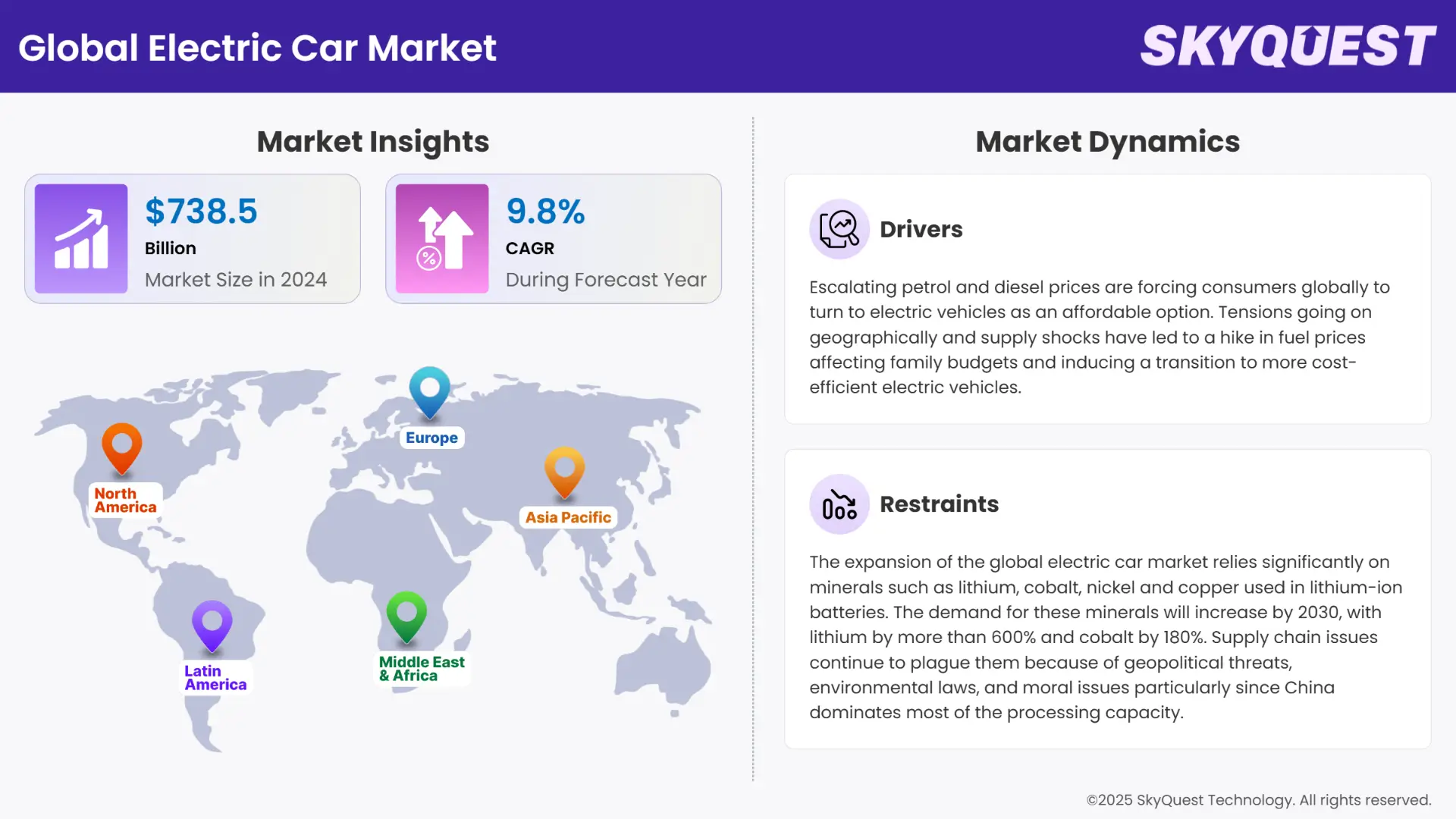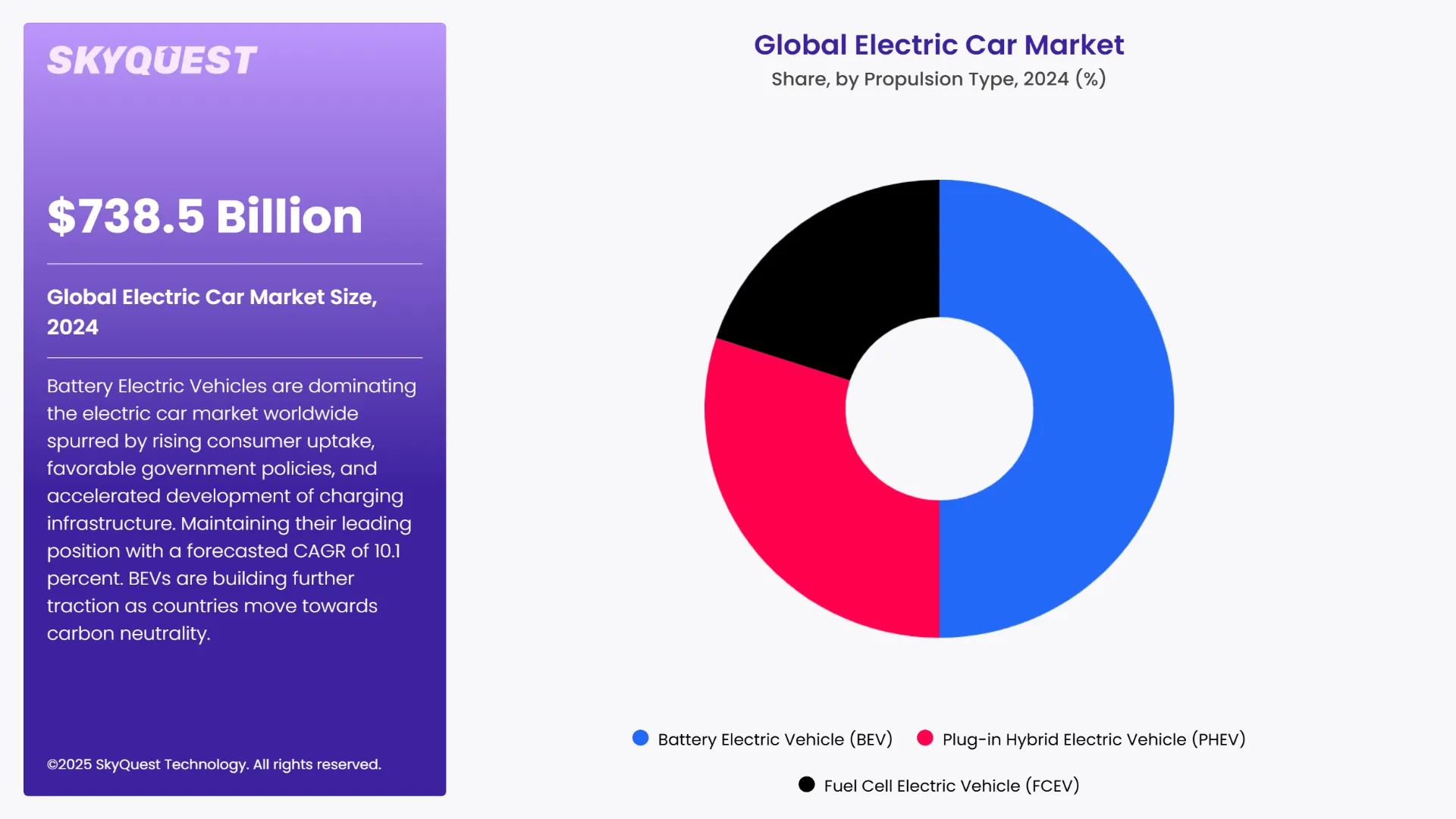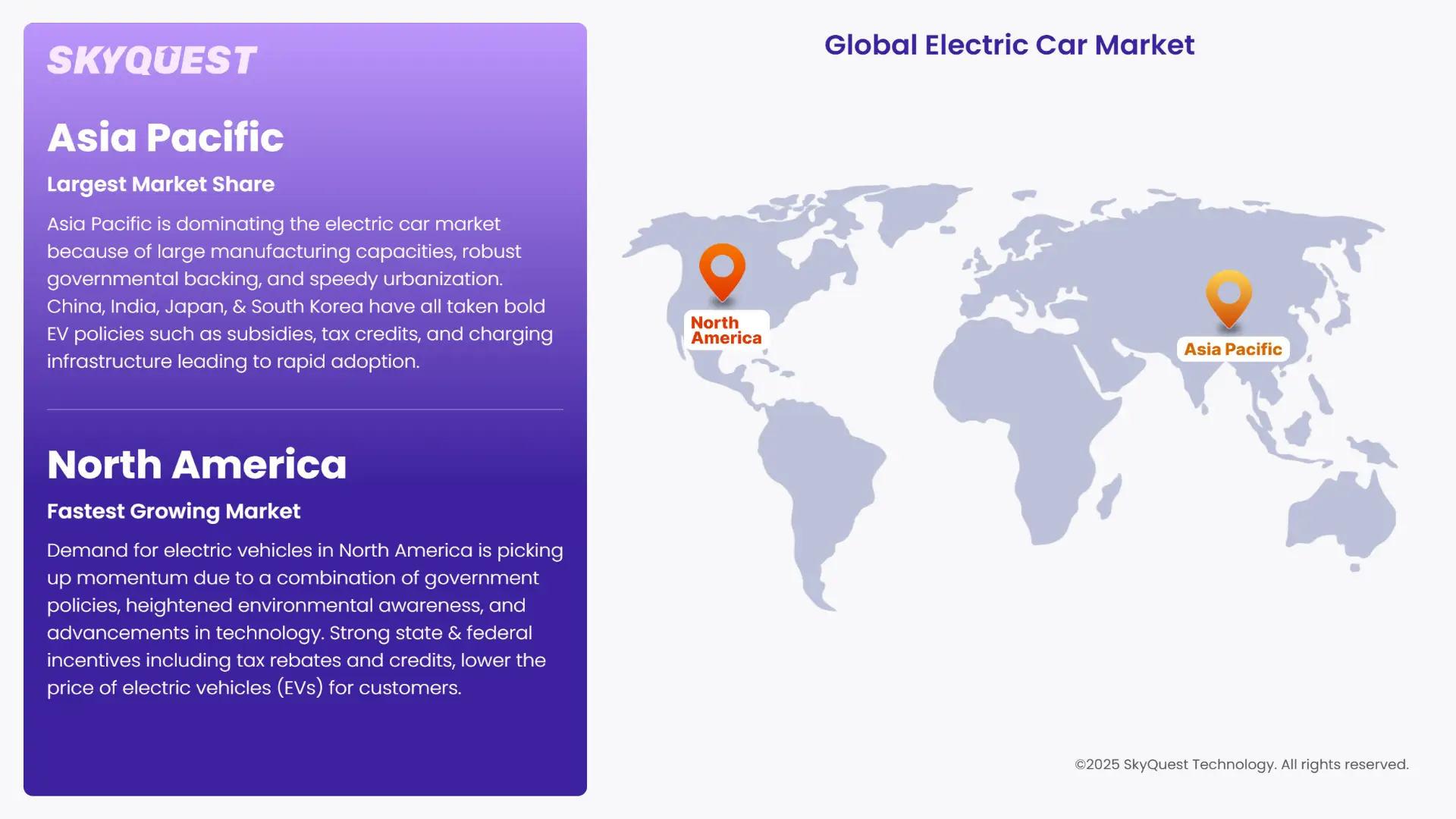
Report ID: SQMIG25C2110

Report ID: SQMIG25C2110
sales@skyquestt.com
USA +1 351-333-4748

Report ID:
SQMIG25C2110 |
Region:
Global |
Published Date: December, 2025
Pages:
196
|Tables:
253
|Figures:
82



Electric Car Market size was valued at USD 738.5 Billion in 2024 and is poised to grow from USD 810.87 Billion in 2025 to USD 1713.06 Billion by 2033, growing at a CAGR of 9.8% during the forecast period (2026–2033).
The Worldwide electric vehicle market is accelerating at full pace, led by government incentives, increasing environmental consciousness and advances in battery technology. Manufacturers are growing their product lines coming up with new car models are gaining increasing customer segments. Pressure from the government to reduce carbon emissions and an inclination towards being sustainable have further energized the move towards electric mobility. With public charging stations for EVs increasing by 40%. Convenient & simple charging availability has played a key role in helping to overcome range anxiety and encourage electric car adoption. government initiates and private investment has boosted the increase in infrastructure so drivers can easily have access to charging stations, either in towns or on motorways. With increasingly comprehensive charging networks, such as the initiative from the European Union to have over 3 million charging points installed by 2030, the ease of electric car ownership is further increased, promoting greater consumer take-up.
How Is AI Enhancing the Efficiency and Safety of Electric Vehicles?
AI is transforming the electric car market by optimizing efficiency, security, & consumer experience. Real time decision making in autonomous driving through sensor fusion and machine learning, enhancing navigation and accident avoidance these all are now possible with the help of AI which facilitate the to do so. AI enabled battery management systems maximize charging cycles and prolong battery life by predicting usage & environmental patterns. Also, AI aids in predictive maintenance through the assessment of data from different vehicle components to identify problems before a failure occurs. AI-powered smart energy routing also aids EVs in connecting with smart grids for efficient use of energy and reduced costs. With the help of AI automotive companies can provide updated software, enhanced performance Along with customized driving experiences making electric cars more intelligent, appealing, sustainable, and attractive to consumers.
What Impact Is Industry Rivalry Having on EV Innovation and Costs?
The EV segment is seeing stiff competition as legacy manufacturers such as Volkswagen, GM, and Ford quickly electrify their portfolios by spending billions in EV technology and infrastructure. Meanwhile, Disruptive entrants like Lucid Motors, Rivian, and Fisker have set very high benchmark which is facilitating the apple cart with innovative designs, greater range, and sophisticated tech offerings. This competitive jolt is driving advances throughout the sector improving performance, lowering battery prices, and shortening production cycles. Incumbents have scale and brand recognition, and startups provide agility and innovation. As all brands compete to stand out and take share, the consumer winds up with more choice, better affordability, and sooner access to the next generation of electric vehicles.

To get more insights on this market click here to Request a Free Sample Report
The global electric car market is segmented into type, power output, processing type, and region. By type, the market is classified into battery electric vehicle (BEV), plug-in hybrid electric vehicle (PHEV), and fuel cell electric vehicle (FCEV). Depending on power output, it is divided into less than 100 kw, 100 kw to 250 kw, and more than 250 kw. According to price range, the market is categorized into less than 100 kw, 100 kw to 250 kw, and more than 250 kw. Depending on end user, it is divided into private, and commercial. Regionally, the market is analyzed across North America, Europe, Asia-Pacific, Middle East & Africa, and Latin America.
Battery Electric Vehicles are dominating the electric car market worldwide spurred by rising consumer uptake, favorable government policies, and accelerated development of charging infrastructure. Maintaining their leading position with a forecasted CAGR of 10.1 percent. BEVs are building further traction as countries move towards carbon neutrality. The US, Canada, Germany, & France are speeding up BEV deployment through measures such as national (EV) Electric vehicle plans, fast charging goals, and battery supply chain investment. For example, Canada will have expected to install 116,700 charging stations by 2030, decreasing range anxiety and improving BEV accessibility. The United States' federal investments in battery manufacturing and charging infrastructure also drive further adoption. These initiatives place BEVs as the most scalable and bankable option for electrifying transport.
Fuel Cell Electric Vehicles (FCEVs) are expected to be the fastest-growing segment in the worldwide electric automobile market with a CAGR of 15.6% through the forecast period.In 2024 the FCEV industry is witnessing increasing momentum driven by technological innovations in hydrogen fuel technology, increased investment in hydrogen infrastructure and state support policies, especially in Japan, South Korea, & Germany. These nations are positioning hydrogen as a cornerstone of their clean energy transition. Compared to BEVs and PHEVs, FCEVs offer rapid refueling and longer ranges, perfect for commercial transportation and long-distance applications. Despite current limitations in refueling infrastructure, greater public-private partnerships and hydrogen national plans are fostering development, rendering FCEVs the quickest-growing form of electric vehicle

To get detailed segments analysis, Request a Free Sample Report
Asia Pacific is dominating the electric car market because of large manufacturing capacities, robust governmental backing, and speedy urbanization. China, India, Japan, & South Korea have all taken bold EV policies such as subsidies, tax credits, and charging infrastructure leading to rapid adoption. China, in fact, leads the world in global EV manufacturing and sales, with backing from its dominant battery manufacturing ecosystem and countrywide New Energy Vehicle (NEV) plan. The region has the added advantage of an emerging middle class, increasing environmental consciousness, and rising fuel prices, all of which push the demand for electric vehicles. The region also has local automakers that are innovating fast and developing their EV offerings, further making electric vehicles more prevalent and affordable. All these strategic factors put Asia Pacific at the vanguard of global EV transformation.
China's electric vehicle market is rapidly growing, powered by firm government mandates, sound domestic production, and pervasive consumer take-up. The Battery Electric Vehicle (BEV) segment is the market leader, powered by policy under the New Energy Vehicle (NEV) program, encouraging zero-emission mobility. Top domestic brands such as BYD, NIO, and Xpeng are driving innovation and production. Low-power, affordable EVs below 100kW prevail due to urban demand and high subsidies. Mid-range electric vehicles are gaining popularity among the middle class, with the range affordability balance. Private ownership is still predominant, aided by tax exemptions and city-level restrictions on fuel-run vehicles. Widespread fast-charging networks, particularly in urban areas, drive EV convenience and reinforce market growth.
Japan's electric vehicle market is steadily advancing on the back of strong policy encouragement, locally developed technology for manufacturers, and growing consumer interest in green transport. Battery Electric Vehicles (BEVs) dominate the market with state encouragement in the form of incentives and policies like the "Next Generation Vehicle Strategy," promoting EV usage and charging point development. Japanese manufacturers like Nissan and Mitsubishi are among the key players in determining the direction of the market with efficient, compact models like the Nissan Leaf. The supremacy of sub-100 kW EVs is indicative of Japan's urban mobility demand, with buyers preferring energy-efficient vehicles for everyday use. Mid-range EVs are especially well suited for urban & suburban commuters because of their affordability and range. Private ownership is the dominant segment encouraged by tax benefits & a solid charging infrastructure in metropolitan areas.
Demand for electric vehicles in North America is picking up momentum due to a combination of government policies, heightened environmental awareness, and advancements in technology. Strong state & federal incentives including tax rebates and credits, lower the price of electric vehicles (EVs) for customers. Furthermore, more stringent emissions and climate targets are forcing automakers to build more EV models. Individuals are increasingly being attracted to electric cars because of lower operating costs, longer battery ranges and expanding charging facilities. Big EV manufacturers like Tesla as well as incumbent players expanding their electric offerings, have also forced more competition and innovation into the market. At the same time the above-mentioned factors are spurring North America rapid adoption of electric cars and driving the region's growing demand.
The United States is the market leader in North America's electric car industry because of its sizeable consumer base, sophisticated technology ecosystem, and strong government encouragement. The US enjoys significant federal incentives such as tax credits to buyers of EVs and investment in charging stations under programs like the Infrastructure Investment and Jobs Act. The established players like Tesla, General Motors, and Ford are fast increasing their electric vehicle offerings, stimulating innovation and pricing. Furthermore, growing consumer consciousness towards sustainability as well as rising fuel prices have sped up the uptake of EVs. The nation extensive public & private network of charging stations also sustains EV expansion, making the US the dominant market leader in North America's electric vehicle market.
Canada is noted to be the fastest-growing electric automobile market within North America, spurred by robust government commitments and beneficial policies. Federal and provincial incentives, such as rebates and tax credits, considerably lower the costs of EV ownership, moving it towards mass adoption. Canada's focus on boosting charging points, particularly in urban and rural areas, makes EVs more convenient. Environmental goals, such as carbon reduction and the transition to clean energy, are core to Canadian policy and further accelerating the market growth. In addition, increasing demand by consumers for environmentally friendly transport and the increasing number of electric models being offered on the market mean that Canada is a rapidly expanding market, to expand still further over the next few years.
Europe leads the electric car market by having robust regulatory systems, bold climate strategies, and heavy investments in charging networks. The European Union's high emissions standards compel vehicle manufacturers to produce EVs in greater numbers. Heavy government subsidies, tax credits for purchasers, encourage consumers to adopt EVs. Europe's extensive charging network between nations makes EV purchasing less inconvenient. The coordination of governments and private companies encourages innovation and infrastructure development.
Germany is one of the dominant markets in Europe electric car market supported by its robust automotive sector and pro electric car policies. Large automakers such as Volkswagen, BMW, and Mercedes Benz are heavily investing in EV technology and ramping up their electric offerings. Incentives like purchase subsidies and tax credits from the government favor consumer take-up. Germany is also quickly growing its charging infrastructure, with a focus on fast-charging stations across the country. With goals for carbon emission cuts & encouraging sustainable mobility.
The UK electric car market is expanding quickly driven by government support and an increasing charging infrastructure network. The government Road to Zero plan comprises grants for buyers of EVs and investment in public charging points. The UK intends to ban new petrol and diesel cars by 2030. Local as well as international players are introducing more electric Cars to meet the increasing demand. Cities like London are turning green with low emission zones encouraging people to switch. All these efforts make the UK a rapidly expanding, powerful market in Europe's EV market.

To know more about the market opportunities by region and country, click here to
Buy The Complete Report
Rising fuel prices are pushing consumers to choose electric cars for cheaper and greener driving.
Rising Fuel Costs and Eco-Concerns Drive Over 50% of Consumers to Choose EVs
Electric Car Growth Faces Risks from Mineral Supply Shortages and Geopolitical Challenges
Lack of Public Charging Hinders EV Adoption, Especially in Cities
Request Free Customization of this report to help us to meet your business objectives.
The global electric car market competitive landscape is defined by strategic innovation, collaborations, and sustainability among top players. Tesla pioneers with high-tech batteries, international Gigafactories, & a wide Supercharger network, increasing production and customer experience. Traditional manufacturers such as Volkswagen & GM are spending billions on EV platforms and battery manufacturing frequently partnering with technology companies in an effort to cut costs and speed up development. Chinese makers BYD & NIO emphasize low prices, innovation such as battery swap-out capabilities & fast local and international expansion. Furthermore, auto makers increasingly focus on digital offerings and software updates as a means to differentiate products. Sustainability and ethical sourcing are also important drivers, with firms instituting transparent supply chains and recycling programs to satisfy regulatory requirements and consumer demands to ensure long-term leadership in markets.
Adoption of Autonomous Driving Technologies for Electric cars
Growing Adoption of Electric Cars Among Younger Consumers
SkyQuest’s ABIRAW (Advanced Business Intelligence, Research & Analysis Wing) is our Business Information Services team that Collects, Collates, Correlates, and Analyses the Data collected using Primary Exploratory Research backed by robust Secondary Desk research.
As per SkyQuest analysis, the global electric car market is witnessing remarkable growth, propelled by advances in technology, supportive government policies, and growing consumer demand for sustainable transportation. Governments are enforcing strict emissions regulations and offering tax incentives, infrastructure funding, and research grants, which are catalyzing electric vehicle (EV) adoption. Innovations in battery technologies—especially lithium-ion and emerging alternatives—have significantly reduced costs while improving range, safety, and energy density. Despite these advancements, supply chain constraints, particularly concerning lithium and cobalt, pose a risk to continued progress. Expanding charging infrastructure remains critical, as inadequate access—especially in emerging markets—continues to impede widespread EV uptake. Strategic investments, public-private partnerships, and smart charging innovations are gradually bridging this gap. Meanwhile, consumer attitudes are shifting, with more individuals prioritizing eco-friendly options and influencing automakers to diversify EV offerings across economy, luxury, and commercial segments. The market is also becoming highly competitive, with legacy manufacturers and new entrants introducing advanced models, integrating autonomous features and connected services. To sustain growth, stakeholders must address supply, infrastructure, and awareness challenges, ensuring the market’s momentum translates into a long-term transformation of the global mobility landscape.
| Report Metric | Details |
|---|---|
| Market size value in 2024 | USD 738.5 Billion |
| Market size value in 2033 | USD 1713.06 Billion |
| Growth Rate | 9.8% |
| Base year | 2024 |
| Forecast period | 2026-2033 |
| Forecast Unit (Value) | USD Billion |
| Segments covered |
|
| Regions covered | North America (US, Canada), Europe (Germany, France, United Kingdom, Italy, Spain, Rest of Europe), Asia Pacific (China, India, Japan, Rest of Asia-Pacific), Latin America (Brazil, Rest of Latin America), Middle East & Africa (South Africa, GCC Countries, Rest of MEA) |
| Companies covered |
|
| Customization scope | Free report customization with purchase. Customization includes:-
|
To get a free trial access to our platform which is a one stop solution for all your data requirements for quicker decision making. This platform allows you to compare markets, competitors who are prominent in the market, and mega trends that are influencing the dynamics in the market. Also, get access to detailed SkyQuest exclusive matrix.
Table Of Content
Executive Summary
Market overview
Parent Market Analysis
Market overview
Market size
KEY MARKET INSIGHTS
COVID IMPACT
MARKET DYNAMICS & OUTLOOK
Market Size by Region
KEY COMPANY PROFILES
Methodology
For the Electric Car Market, our research methodology involved a mixture of primary and secondary data sources. Key steps involved in the research process are listed below:
1. Information Procurement: This stage involved the procurement of Market data or related information via primary and secondary sources. The various secondary sources used included various company websites, annual reports, trade databases, and paid databases such as Hoover's, Bloomberg Business, Factiva, and Avention. Our team did 45 primary interactions Globally which included several stakeholders such as manufacturers, customers, key opinion leaders, etc. Overall, information procurement was one of the most extensive stages in our research process.
2. Information Analysis: This step involved triangulation of data through bottom-up and top-down approaches to estimate and validate the total size and future estimate of the Electric Car Market.
3. Report Formulation: The final step entailed the placement of data points in appropriate Market spaces in an attempt to deduce viable conclusions.
4. Validation & Publishing: Validation is the most important step in the process. Validation & re-validation via an intricately designed process helped us finalize data points to be used for final calculations. The final Market estimates and forecasts were then aligned and sent to our panel of industry experts for validation of data. Once the validation was done the report was sent to our Quality Assurance team to ensure adherence to style guides, consistency & design.
Analyst Support
Customization Options
With the given market data, our dedicated team of analysts can offer you the following customization options are available for the Electric Car Market:
Product Analysis: Product matrix, which offers a detailed comparison of the product portfolio of companies.
Regional Analysis: Further analysis of the Electric Car Market for additional countries.
Competitive Analysis: Detailed analysis and profiling of additional Market players & comparative analysis of competitive products.
Go to Market Strategy: Find the high-growth channels to invest your marketing efforts and increase your customer base.
Innovation Mapping: Identify racial solutions and innovation, connected to deep ecosystems of innovators, start-ups, academics, and strategic partners.
Category Intelligence: Customized intelligence that is relevant to their supply Markets will enable them to make smarter sourcing decisions and improve their category management.
Public Company Transcript Analysis: To improve the investment performance by generating new alpha and making better-informed decisions.
Social Media Listening: To analyze the conversations and trends happening not just around your brand, but around your industry as a whole, and use those insights to make better Marketing decisions.
REQUEST FOR SAMPLE
Want to customize this report? This report can be personalized according to your needs. Our analysts and industry experts will work directly with you to understand your requirements and provide you with customized data in a short amount of time. We offer $1000 worth of FREE customization at the time of purchase.
Feedback From Our Clients